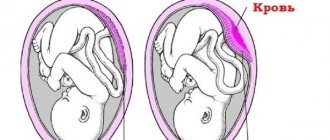What's happening
At 20 weeks of pregnancy, the baby’s layer of brown subcutaneous fat increases, a pasty vernix lubrication forms on the body (it sticks to the skin thanks to lanugo), and hair begins to grow on the head. Now the fetus continues to develop the rudiments of molars, the ears and nose are enlarged, the brain has more and more convolutions and grooves, and the heart beats at a frequency of 120 - 160 beats per minute.
At the 20th week of pregnancy, the baby's eyes begin to open slightly. His visual organs are still imperfect, but he perfectly hears the sounds of the environment and moves actively. By this time, the child can roll over, bend and stretch his arms and legs, swallow and spit out amniotic fluid, grimace and purposefully touch the walls of the uterus.
Fetal development at the twentieth week of pregnancy
The weight of the fetus at week 20 is about 340 g, its size is no more than 25 cm. It has fully formed visual organs, so it reacts more and more actively to light stimuli - bright light, light flashes.
By the end of the 20th week, the skin is almost completely formed. Numerous folds appear on his skin. During this period of time, the lungs are actively forming, and the fetus’s intestines are already working. Meconium forms in the intestines, which is a greenish mass containing waste from the body.
In the middle of pregnancy, the child’s body is almost completely formed. He needs to grow a little to be born. At this stage of development, the child has mobile facial expressions. Involuntarily he wrinkles his nose and makes various grimaces, which are clearly visible on ultrasound.
20 weeks Your baby is the size of a banana
Stretch marks (striae) on the abdomen
During pregnancy, the hormone progesterone acts on the skin, which prepares the body for childbirth. Skin tissue and muscles become softer and more elastic, due to which the abdomen stretches, adapting to the size of the fetus. Moreover, at the 20th week of pregnancy, in some places the connective tissue is stretched so much that it cannot withstand it and breaks. At the site of the rupture, striae form, which are nothing more than internal scars. It is precisely because scars are located under the skin that they are very difficult to deal with. And to avoid the appearance of new stretch marks, prevention is needed: weight control and daily skin care using special cosmetics.
Non-pathological causes of nagging pain at week 20
A woman holds her stomach.
Unpleasant sensations in the stomach can occur due to physiological processes. You should know all the reasons to avoid serious consequences. If you feel pain in your lower abdomen at 20 weeks of pregnancy, you should visit a doctor.
They are as follows:
- The size of the uterus has changed. The organ may enlarge or stretch, as well as change the structure of the ligaments. This can lead to discomfort, tension and pain.
- Skin tension. Unpleasant sensations may appear due to tension in the abdominal wall. Itching, burning and other discomfort appears on the skin.
- Restructuring of the pelvic bones occurs. When hormones begin to be produced, the bones will not be as mobile, and this leads to nagging pain.
Unpleasant sensations at week 20 may occur when getting out of bed, as well as when bending sharply. They will pass quickly, and you won’t even have to take medications to relieve the pain.
If a pregnant woman experiences aching, nagging pain in the lower abdomen that does not cause severe discomfort, then this is normal. You just need to monitor your health and pay attention to all symptoms. If it gets worse, you need to contact your doctor for an examination.
Risk factors
At 20 weeks of pregnancy, urine stagnation is a dangerous point. And if an infection enters the body, there is a risk of developing kidney inflammation (pyelonephritis). The disease can be prevented by periodically unloading the kidneys. To do this, from time to time during the day you need to take a knee-elbow position for a few minutes. With this position of the body, the pressure of the uterus on the kidneys is relieved, and urine flows freely into the bladder.
At the 20th week of pregnancy, prolonged uterine tone is very dangerous. To prevent this from happening, you need to avoid heavy lifting, overexertion and nervous shock. If you notice that your stomach often becomes hard, tell your doctor about it: the specialist will prescribe medications to eliminate this condition.
Dangerous pain at 20 weeks
Severe stomach pain
There are pains that are considered dangerous to the health of a pregnant woman. If this happens, then there is no way to do without medical help.
The following dangerous pains:
- Cramping, drawing attacks. You should immediately visit a doctor, otherwise there will be a high risk of miscarriage. Placental abruption may occur. There may also be various discharges mixed with blood.
- Girdle pain that radiates strongly to the lower back. There may be a burning sensation when going to the toilet, and this indicates that pyelonephritis is developing. In this case, treatment may take a long time.
- In later stages, contractions and increased uterine tone may occur. This may indicate that premature labor is beginning.
If the above pains are detected, as well as bloody discharge from the vagina, you should seek help from a doctor. It is best to call an ambulance so that specialists can send the pregnant woman to the hospital.
Medical observation
If before the 20th week of pregnancy the expectant mother visits the antenatal clinic once a month, then after this period she needs to be examined twice as often. At this stage, the gynecologist may prescribe an ultrasound and blood and urine tests: the first is done to monitor hemoglobin and glucose levels, and the second to determine how the kidneys are working.
Ultrasound examination is carried out from the 18th to 24th week and is multidisciplinary. The doctor determines to what extent the size of all fetal organs corresponds to the norms and how they function. Also, at the 20th week of pregnancy, the length of the cervix, the amount of amniotic fluid are measured, and the location of the placenta is specified. If necessary, in parallel with the ultrasound, a triple blood test is prescribed to determine developmental defects.
Features of discharge
At 20 weeks of pregnancy, discharge may become more abundant than before. Don't worry about this if they are light gray or milky in color. There should not be any unpleasant odor or discomfort. If a pregnant woman has yellow or green discharge that smells strongly, this may indicate the development of an infection.
Any change in discharge can lead to serious consequences, so you should immediately consult a doctor. If bloody or brown discharge is detected, you should immediately call an ambulance. Blood from the vagina, nagging pain can lead to miscarriage. If spotting appears rarely and is not accompanied by pain, then this is normal. The maximum that a pregnant woman can have is cervical erosion.
Recommendations
At the 20th week of pregnancy, all previous recommendations remain valid. You already know that you need to monitor the quality of your diet and follow a regimen: eat in small portions, do not overuse foods that cause allergies (citrus fruits, etc.). Surely you walk a lot, and maybe you have already started attending special classes for pregnant women.
If you experience dizziness at 19–20 weeks of pregnancy, try not to fast. Feel like you need to sit down or lie down? Don't be shy and do it! Move carefully, without sharp turns or climbs, try not to stay in the same position for a long time.
If your legs swell during the 19th – 20th week of pregnancy, keep them elevated more often. Make a habit of doing a massage with cream in the evenings. Before that, you can pamper your feet with a cool bath with your favorite essential oil.
Diagnostic methods
A pregnant woman visits a doctor.
If you have nagging pain, you should go to a gynecologist, unless there are any acute symptoms. If a pregnant woman is brought to the hospital with acute pain, an emergency examination is performed. The most well-known method is to perform an ultrasound. The procedure will help find pathologies if there is no severe abdominal pain.
At week 20, an ultrasound may be prescribed for routine assessment of the child’s development. Using this procedure, you can find out whether the baby is developing normally. The examination will help determine the amount and condition of amniotic fluid. The doctor will be able to analyze the fetal placenta.
Important! The procedure helps the doctor see how well the baby’s stomach, kidneys, intestines, and heart are developing. At week 20, you can understand whether the child has any pathologies that require additional diagnostics.
Checklist for 20 weeks of pregnancy
- Update your wardrobe: your belly quickly increases in size in the second trimester.
- Continue to lead an active lifestyle: this will help you cope more easily with all the hardships of pregnancy and prepare for childbirth.
- If colostrum appears, you should stock up on absorbent breast wipes.
You can undergo all types of ultrasound during pregnancy, including 3D or with Doppler, at the Women's Medical Center. We have the most modern equipment with highly sensitive sensors. Our specialists have many years of practical experience, which means that the likelihood of errors during the study is excluded.
Useful advice for an expectant mother
The shortest answer to the question of how to develop a Baby before birth will be this: with love, in a good mood and every day.
Many mothers, without knowing it themselves, quietly develop their Baby during the nine months before birth. There are also those who, preoccupied with the problem of prenatal development, do more harm to the Baby than they do good. Let's imagine a Baby who has healthy genetics, his mother eats right, monitors his daily routine, rests, goes for walks, loves his baby and communicates with him - the way he knows how and in the best way possible. Is she developing it? Or does the Baby develop on his own as a result of the favorable conditions received from nature and his mother? In this case, let’s not take away our Baby’s serious victories - growth and natural (physical, mental, emotional) development. In other words, we will assume that the child develops on his own.
Of course, your loving spontaneous communication with your Baby has a developing effect. However, in order to fully feel your contribution to its development, you need to do something special, setting aside a certain time and, possibly, a place for it, and also being aware of what and why you are doing.
Our next step is to determine at what age the Baby’s development can begin. To do this, let us first remember the sequence in which his sense organs develop and reach relative maturity - they are the ones who supply the brain with signals from the external environment and are the basis for the subsequent development of movements (motor skills), orientation in space, emotions, mental processes (perception, attention, thinking, memory, speech), cognitive sphere.
- The vestibular apparatus (the organ of balance and coordination of movements) begins to develop the earliest, at 3-5 weeks, but reaches relative maturity by 24-26 weeks.
- The sense of touch begins to develop in the 7th week, becoming more and more improved every day.
- Taste: taste buds are formed at the 8th week, at the 11th week the Baby already reacts to sweet and salty tastes, and from the 18-22nd week his taste preferences are formed;
- Sense of smell: The baby is able to recognize some odors at approximately 24-26 weeks.
- Hearing: The baby is able to identify the source of sound (external or belonging to the mother’s body) at the 20th week, distinguish loud sounds at the 25-28th week, and by the 32nd he can distinguish the voices of loved ones.
- Vision is still imperfect even at the time of birth.
In the future, we will use the method of elimination to determine those sense organs that, in principle, are amenable to special development.











